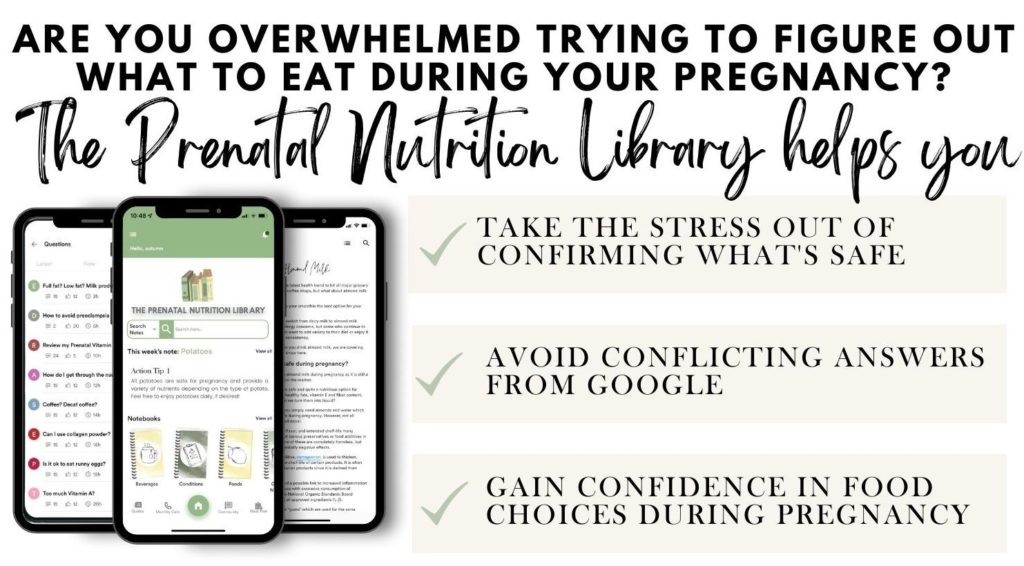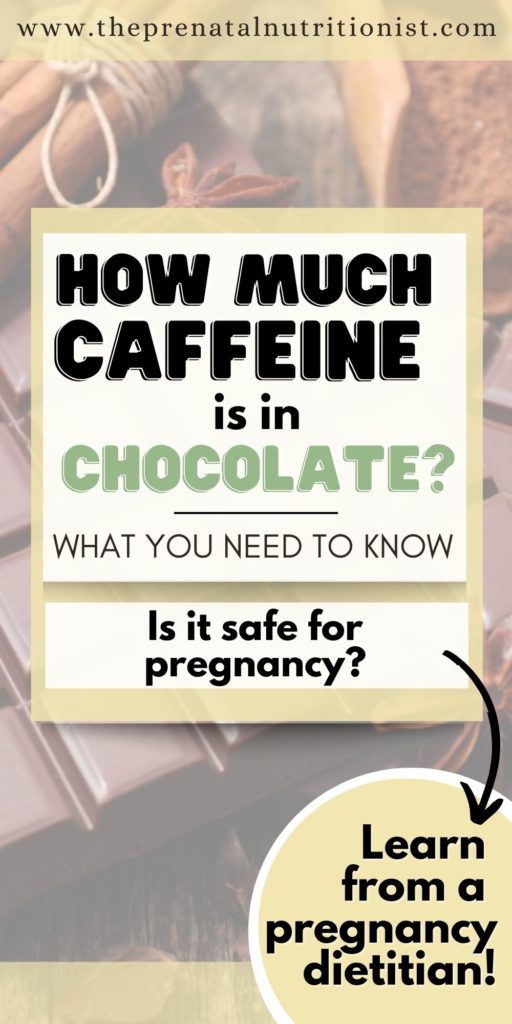
Caffeine is a stimulant commonly found in many foods and beverages. It acts as a mild central nervous system stimulant, providing an energy boost and making you feel more alert. However, during pregnancy, it’s important to be mindful of your caffeine intake, as high amounts can potentially impact your growing baby’s health.
One of the major sources of caffeine for many people is coffee. A typical cup of brewed coffee can contain anywhere from 95 to 200 milligrams of caffeine, depending on the type and size. But caffeine isn’t only present in coffee–it can also naturally occur in other items like chocolate. Caffeine occurs naturally in cocoa beans, a primary ingredient in most types of chocolate.
(You can learn more about the research on caffeine during pregnancy inside The Prenatal Nutrition Library.)
Chocolate, in particular, is one of the most common food cravings reported during pregnancy and outside of pregnancy. It’s a treat enjoyed by many and in a variety of ways! However, as expectant mothers, we must make informed choices on what we’re consuming and putting into our bodies to support a healthy pregnancy. For more on common pregnancy cravings, check out this post.
Today, I will discuss how much caffeine is present in different types of chocolate. As a food item commonly craved and enjoyed during pregnancy, understanding the levels of caffeine in chocolate can help manage intake and put to rest any concerns around moderate consumption!
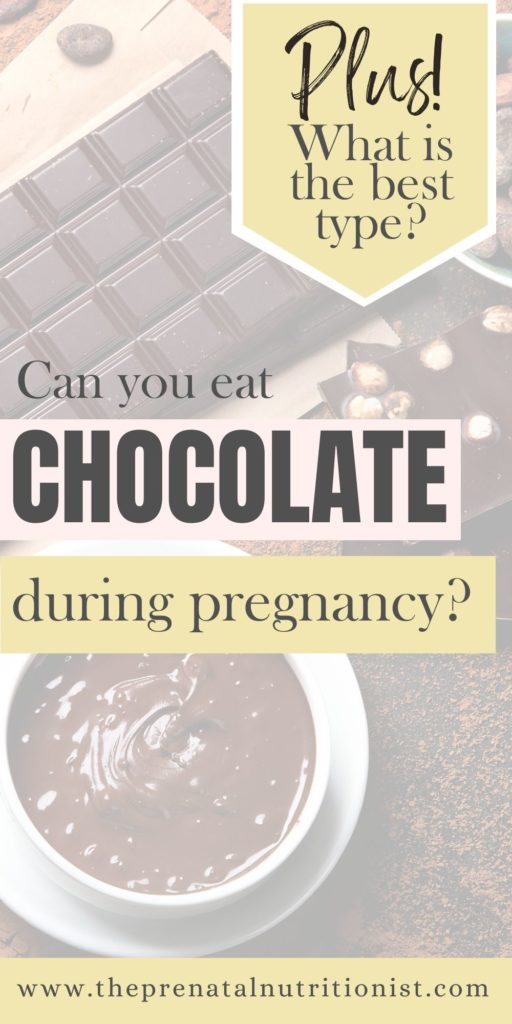
How Much Caffeine Is In Chocolate?
As mentioned above, chocolate is a common craving experienced outside and during pregnancy. There are a few important considerations when it comes to eating chocolate. One is caffeine! We’ll discuss more below to help you understand how much caffeine each variety contains on average to make informed choices. Let’s break down the details:
Milk Chocolate
Milk chocolate generally contains less caffeine than dark chocolate since it has a higher cocoa butter and milk content, diluting the cocoa solids where caffeine is found. It typically contains 10-30% cocoa solids, the remainder being sugar, milk and other ingredients.
The average milk chocolate bar ranges from 6-10mg of caffeine depending on the brand and country of origin of the cocoa beans being used. Cocoa beans from Central and South America tend to yield slightly higher caffeine chocolate than those from West Africa.

Dark Chocolate
With a cocoa content of 50% or higher, dark chocolate provides more caffeine than milk chocolate. It averages around 10 mg per square of dark chocolate and 40-80 mg of caffeine for a full bar. Again, it depends on the percentage of cocoa and bean origin. The darker the chocolate (higher % cocoa), the more robust the cocoa flavor, and caffeine content increases accordingly.
White Chocolate
By strict definition, white chocolate contains no cocoa solids since it’s primarily cocoa butter, sugar, milk, and flavoring. Without any cocoa solids, white chocolate doesn’t have any significant caffeine content. This answers the common question, “Does white chocolate have caffeine?” and makes it a good option if you are looking to satisfy your cravings.
Unsweetened Baking Chocolate
As its name suggests, unsweetened baking chocolate is 100% pure chocolate liquor/cocoa solids without additional ingredients. Therefore, it delivers the highest caffeine spike–approximately 23 mg per 1 ounce square. Its intense bitterness means generous sweetening is required for ingestion.
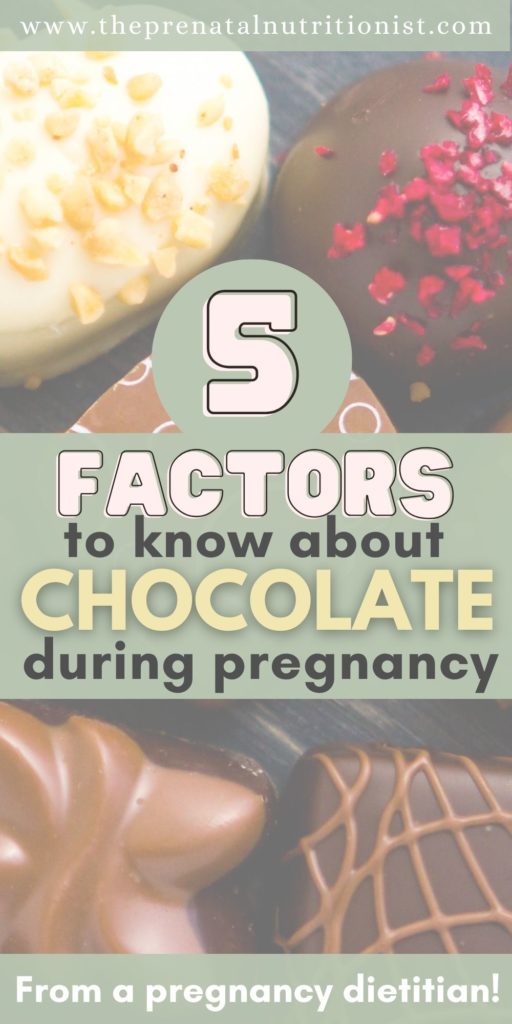
Can You Eat Chocolate While Pregnant?
One common question expectant mothers ask me is – “can I eat chocolate while pregnant?”. The short answer is yes, you can enjoy chocolate in moderation during pregnancy. Chocolate is a yummy treat that can be enjoyed during pregnancy in reasonable amounts.
That said, there are a few factors to consider when eating chocolate:
- Caffeine content: Be mindful of caffeine intake from all sources combined, including coffee, tea, and chocolate. A typical serving of dark chocolate (1-2 squares) contains significantly less caffeine than a small cup of brewed coffee or espresso.
- Nutrient density: Dark chocolate offers some nutritional benefits, like a small amount of non-heme iron, magnesium, fiber, and antioxidants, compared to other varieties.
- Be mindful of sugar intake: The American Heart Association recommends that women consume no more than 25 grams of added sugar daily.
- Check blood sugar levels: You can still enjoy chocolate with Gestational Diabetes. Monitor your intake and track your blood sugars at home.
- Heartburn for some: Unfortunately, chocolate is a common trigger of heartburn. This isn’t the case for everyone. However, if heartburn is a symptom you’re battling, you may want to eliminate it for some time.
Dark chocolate with 70% or higher cocoa content offers some extra nutrition benefits compared to other types of chocolate. It provides beneficial plant compounds and loads of antioxidants. Studies show that dark chocolate and cocoa can improve blood flow and lower blood pressure. Enjoy your chocolate during pregnancy while monitoring your sugar and caffeine consumption. Moderation is key!
Dark chocolate may also be supportive of male fertility. Not only has it been shown to increase sperm quality, but eating chocolate is often associated with happiness. Consuming chocolate may improve your mood, making you calm and less anxious. Win-win for both partners!
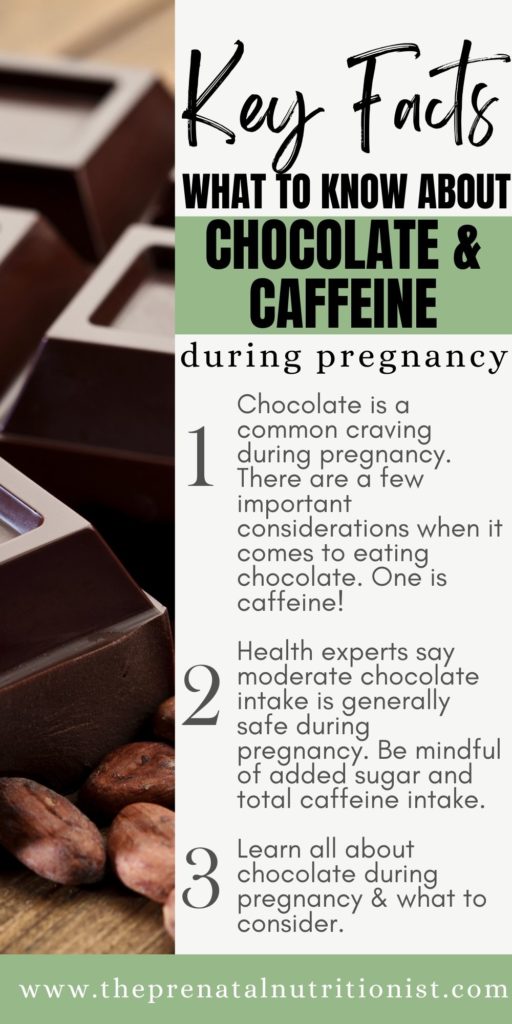
Though chocolates contain some caffeine, they can still be enjoyed while pregnant.
Most health experts agree that moderate chocolate intake is generally safe during pregnancy unless you’re very sensitive to caffeine or have an allergy. As always, moderation is key. Be mindful of added sugar and total caffeine intake, and include chocolate in a balanced diet.
I hope this post helped explain how much caffeine you can expect based on the type of chocolate! As always, let me know in the comments if you have any other questions!
Focusing on a well-balanced diet, incorporating plenty of fluids, and being mindful of overall added sugar and caffeine intake are just a few aspects of a healthy pregnancy. Make my blog your regular go-to guide for all things food and nutrition for pregnancy. I’ve covered many topics on the blog, including healthy sweets for pregnancy and more!
For more in-depth information on nutrition during pregnancy and expert-crafted trimester meal plans, be sure to join The Prenatal Nutrition Library (TPNL). The Prenatal Nutrition Library is your one-stop shop for evidence-based answers to all your pregnancy nutrition questions so you know what you eat is safe and provides optimal nutrients for pregnancy.
Want to try a sample meal plan first? Download my FREE 1-week meal plan for pregnancy!



